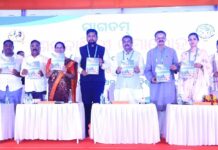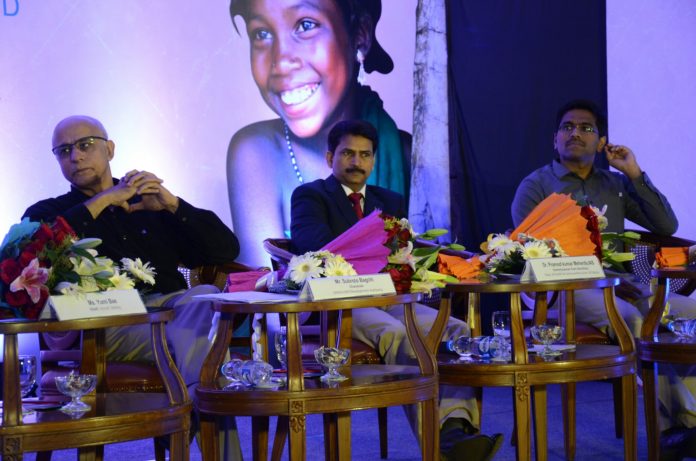By Soumya Mohanty
BHUBANESWAR:On the 70th anniversary of its founding, UNICEF celebrates the immense progress made for the world’s children – and renews the urgent call to reach millions of children whose lives and futures are endangered by conflict, crisis, poverty, inequality and discrimination.
To mark the occasion, UNICEF Odisha organized an event in Bhubaneshwar on Monday, December 12, 2016 that saw participation from prominent personalities: Subroto Bagchi, Chairman, Odisha Skill Development Authority as the Chief Guest, Dr Pramod Kumar Meherda, IAS, Commissioner Cum Secretary, Department of Health & Family Welfare and D. Prasanth Kumar Reddy, IAS, Director, Department of Women and Child Development, Government of Odisha as Guests of Honour and Yumi Bae, Chief, UNICEF Odisha.
Speaking on the occasion, Yumi Bae, said, “UNICEF has evolved across seven decades from an agency that provided relief to war-affected European children in the wake of World War II to an organization across 190 nations that works with government and a range of partners to ensure the rights of children, especially those that are the most marginalized. She further added, “While we need to keep our to focus to reach the very last child to ensure they survive and thrive, UNICEF today also has to strategically respond to emerging challenges and the risks they may pose to rights of child around the globe – be it climate change or urbanization and technology.”
The chief guest and keynote speaker, Subroto Bagchi, spoke on the theme of change, “A great needs matching, and colliding force.
Transformational change is needed to fuel any kind of good activity and UNICEF has made a lot of transformational changes over these golden seven decades. I congratulate UNICEF for bringing smiles in so many faces and hope it will create a better future ahead.”
A photo exhibition displayed glimpses of UNICEF’s work globally, in India and Odisha. A short film demonstrating UNICEF’s presence and work across decades was also screened on this occasion. The event was attended by government officials, legislators, college students, civil society and media.
UNICEF is a leading humanitarian and development agency working globally for the rights of every child. Child rights begin with safe shelter, nutrition, protection from disaster and conflict and traverse the life cycle: pre-natal care for healthy births, clean water and sanitation, health care and education.
UNICEF has spent 70 years working to improve the lives of children and their families. Working with and for children through adolescence and into adulthood requires a global presence whose goal is to produce results and monitor their effects. UNICEF also lobbies and partners with leaders, thinkers and policy makers to help all children realize their rights—especially the most disadvantaged.
Together with partners, it works in 190 countries and territories to translate its commitment into practical action, focusing special effort on reaching the most vulnerable and excluded children, to the benefit of all children, everywhere.
UNICEF established its office in India in 1949 with just 3 employees. Today it works in in the country through 13 state offices, including the one in Odisha that was set up in 1986.
A few key milestones reached by India over the past seventy years that include UNICEF support:The start of UNICEF’s partnership and journey in India was with the setting up of the first Penicillin plant in 1949 with the Government of India. UNICEF supported with equipment and technical assistance.
In mid-50s, UNICEF joined hands with AMUL becoming part of a great beginning of what we know as the White Revolution in India.
In late-70s, UNICEF supported the Government in fighting drought and developing the world-famous hand-pump, India Mark II. It supplied water to millions in rural India, and now the technology is exported to more than 40 countries around the world.
UNICEF has the honour of supporting the Government in eliminating maternal and neonatal tetanus. Millions of children now reach their third birthday without the threat of this deadly disease.
UNICEF also provided technical support to the Government in providing nutritious food to millions of children through the Integrated Child Development Services scheme, which has improved nutrition, reduced infant mortality rate, and helped reduce stunting in children.
The elimination of polio from the country. Support to the Swachh Bharat Mission to make India Open Defecation Free






























